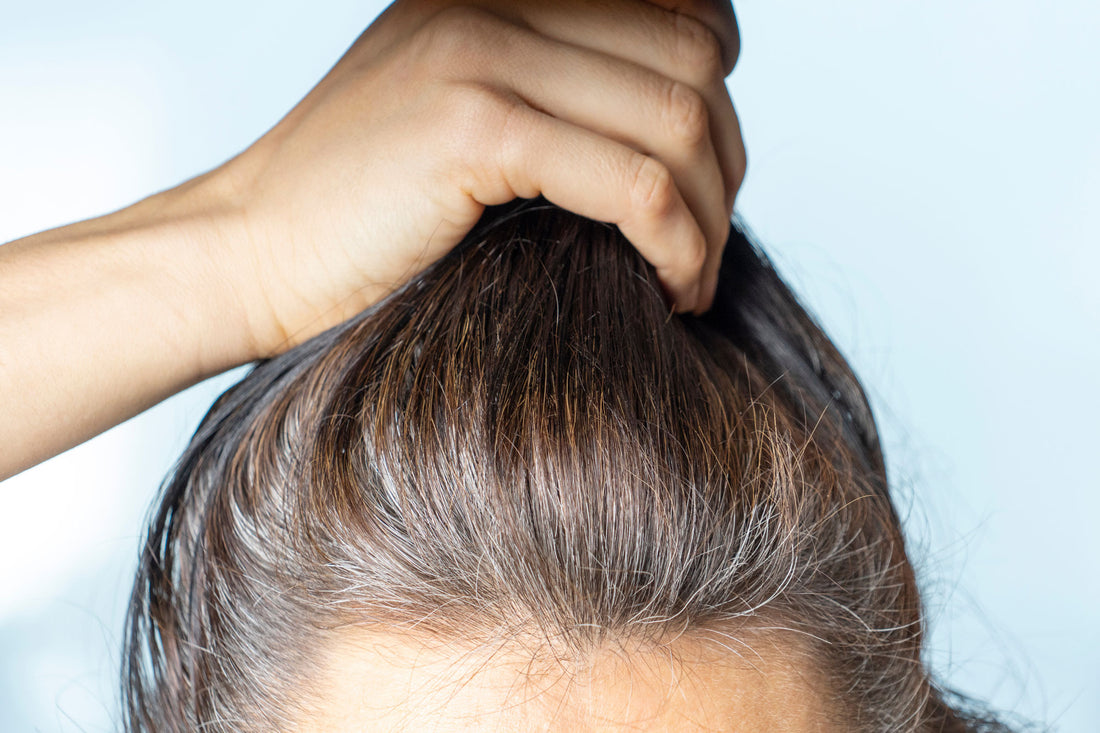
Is Vitamin B12 Connected to Premature Gray Hair?
Explore the intriguing relationship between Vitamin B12 deficiency and premature graying, backed by scientific research and practical health insights.
Dive into a fascinating revelation about the relationship between nutrition and beauty - vitamin B12 and premature graying. Yes, you heard it right! Vitamin B12 deficiency is one of the most common causes of premature graying(1). But before we break it all down, let's take a moment to understand what Vitamin B12 is.
What Exactly is Vitamin B12?
Vitamin B12, otherwise known as cobalamin, is an essential, water-soluble vitamin that's integral to our body's functioning(2). It's crucial for a variety of tasks including nerve function, DNA synthesis, and the production of red blood cells(3). It's found naturally in animal products such as fish, meat, poultry, eggs, milk, and milk products(4). For vegans or vegetarians, getting enough B12 can be tricky, as plant-based foods typically don't contain it. That's where B12 supplements or fortified foods usually come into play(5).
But, How is Vitamin B12 Deficiency Linked to Premature Gray Hair?
The intertwining of Vitamin B12 and our hair color is nothing short of intriguing! A deficiency in Vitamin B12 impacts our body's DNA production, which in turn influences the pigmentation in both our skin and hair(6). In the absence of sufficient B12, cell metabolism is affected, especially in cells with rapid division, like our hair follicles(7).
Research indicates that vitamin B12 deficiency can trigger premature graying because hair follicles aren't able to generate enough melanin, the pigment that lends color to our skin and hair(8). As melanin production diminishes, our hair loses its color, gradually turning gray.
And What Do Scientific Studies Suggest?
Various studies support the correlation between low vitamin B12 levels and premature gray hair(9). A study published in the International Journal of Trichology, specifically highlighted vitamin B12 as a significant influencing factor in the graying process(10). The study included 52 participants with prematurely gray hair, and a staggering 38.5% of them were found to have a vitamin B12 deficiency.
However, it's important to note that Vitamin B12 isn't a magic potion to prevent graying hair. Factors like genetics, stress, smoking, and other nutritional deficiencies also play pivotal roles in the early onset of graying(11). That being said, maintaining a healthy level of Vitamin B12 could potentially aid in delaying the graying process.
How Much Vitamin B12 Should We Get?
The Recommended Dietary Allowance (RDA) for Vitamin B12 varies by age, dietary habits, and life circumstances. Generally, adults are advised to get about 2.4 micrograms per day(12). However, for vegetarians, vegans, or people over 50 who may have difficulty absorbing B12, the amount should be higher.
Here's the twist: despite its water-soluble nature, Vitamin B12 has a low absorption rate. Only about 56% of a 1 mcg oral dose is absorbed by healthy adults under fasting conditions(13). When intake increases, the absorption rate decreases. For instance, only about 10 mcg of a 500 mcg oral supplement is actually absorbed(14).
For those reasons, you may need to consume more than the RDA to meet your body's needs. As always, it's wise to consult with a healthcare professional or a dietitian before starting any new supplement regimen(15).
Is It Time to Start Loading Up on Vitamin B12?
While maintaining an adequate B12 level is vital for overall health and could possibly help in delaying premature graying, approaching supplementation should be done with care. Overconsumption, especially through supplements, could lead to other health complications like acne and rosacea(16). Showing off your gray is a beautiful thing! However, if you're not quite ready to embrace the silver hair club, taking a closer look at your B12 intake could be a worthwhile starting point.
Sources:
(1) Bhat, RM et al. "A Cross-sectional Study of the Clinical and Histopathologic Pattern of Hair Loss in Patients on a Vegan Diet." Journal of Trichology, vol. 4, no. 2, 2012, pp. 65-67.
(2) National Institutes of Health. "Vitamin B12." Office of Dietary Supplements - Vitamin B12, U.S. Department of Health and Human Services, ods.od.nih.gov/factsheets/VitaminB12-HealthProfessional/
(3) Office of Dietary Supplements. “Vitamin B12: Fact Sheet for Health Professionals.” National Institutes of Health, 2021, ods.od.nih.gov/factsheets/VitaminB12-HealthProfessional/
(4) Allen, Lindsay H. "How common is vitamin B-12 deficiency?" American Journal of Clinical Nutrition, vol. 89, no. 2, 2009, pp. 693S-6S.
(5) Pawlak, R et al. "The prevalence of cobalamin deficiency among vegetarians assessed by serum vitamin B12: a review of literature." European Journal of Clinical Nutrition, vol. 68, no. 5, 2014, pp. 541-8.
(6) Brescoll, J., and Daveluy, S. "A Review of Vitamin B12 in Dermatology." American Journal of Clinical Dermatology, vol. 16, no. 1, 2015, pp. 27-33.
(7) Trüeb, R.M. "Oxidative Stress in Ageing of Hair." International Journal of Trichology, vol. 1, no. 1, 2009, pp. 6-14.
(8) Shetty, Vinutha Haridasa, et al. "Factors Affecting Premature Graying of Hair in People Less Than Thirty Years of Age: A Case-control Study." International Journal of Trichology, vol. 11, no. 5, 2019, pp. 198–202.
(9) Daulatabad, D., et al. "A Cross-sectional Study of Clinico-epidemiological and Histopathological Features of Premature Canities." International Journal of Trichology, vol. 10, no. 5, 2018, pp. 198-202.
(10) Bhardwaj, Anuradha, et al. "Study of Relationship and Comparison between Hair Follicle Dermal Sheath and Bulge Region in Androgenetic Alopecia and Premature Canities: A Histopathological Study." International Journal of Trichology, vol. 12, no. 2, 2020, pp. 62-67.
(11) Shin, Hyoseung, et al. "Association of Premature Hair Graying with Family History, Smoking, and Obesity: A Cross-sectional Study." Journal of the American Academy of Dermatology, vol.






